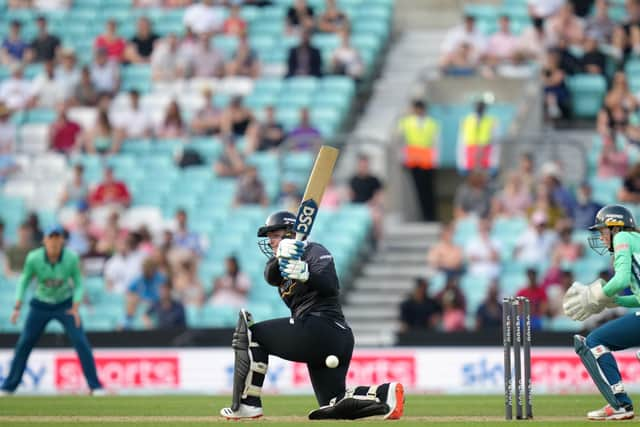The Hundred: Just what is the point of cricket’s fourth format? – Chris Waters


I am, of course, referring to The Hundred – the analogy, therefore, perhaps appropriate.
The “show”, however, was never the point – at least not for me and like-minded critics.
Advertisement
Hide AdAdvertisement
Hide AdIf people want to watch The Hundred, let them watch The Hundred – one man’s meat is another man’s poison.


My objection has nothing to do with “the show”, or even the cricket, and everything to do with the collateral damage wreaked on the rest of cricket by having to find a five-week slot for The Hundred at the height of summer.
Advocates claim that the tournament will protect cricket by winning new followers and thereby safeguard the game’s future. I regard that as an extremely unsafe assumption.
There has certainly been nothing in the underwhelming ticket sales to date, or the interested demographic, to suggest that the gains will so heavily outweigh the losses that the competition will achieve anything like such a grandiose objective; however, we can see that it is simultaneously undermining so much of what is good about the sport.
Advertisement
Hide AdAdvertisement
Hide AdFor me, one of the saddest aspects has been listening to people I respect – former players, captains, some of them now working in the media – waxing lyrical about a tournament that is so obviously to the detriment of other forms of cricket.


Why are they talking like this? I really cannot say, although I do note that they are working for the BBC and Sky, who have a particular interest in The Hundred’s success.
Again, fair enough – if people want to praise The Hundred, for whatever reason, let them praise The Hundred.
Just please don’t come on our radios and televisions this winter and start criticising batting techniques when England are 50-7 on day one of the first Ashes Test, or start moaning when England flop at future 50-over World Cups because we have sidelined that form of the game.
Advertisement
Hide AdAdvertisement
Hide AdAlas, the right of such pundits to criticise in this way has been lost, their credibility eroded. They probably don’t even realise yet the looming contradiction.
A common theme running through their arguments, and those who agree with them, is that The Hundred is only cricket and that they will judge it on the quality of that cricket.
Well, what else would they judge it on, you might say? The quality of its pies, the quality of its match programmes, the quality of its DJs and in-game music?
But the quality of its cricket is actually the last thing on which The Hundred should be judged.
Advertisement
Hide AdAdvertisement
Hide AdWe can take it as read that the cricket will be good (assuming that you like white-ball cricket in the first place), and even accounting for the absence of so many overseas/international stars. Quality players will still produce quality whatever the format, although the skills are obviously not always transferable, which is part of the point.
But what The Hundred should be judged on – indeed, the only thing it should be judged on – is whether it makes people hitherto uninterested in cricket become cricket fans, its alleged raison d’etre, and, moreover, in sufficient numbers to compensate for those who have lost or are rapidly losing interest in the game, myself included.
For it is not just about attracting new fans, it is about keeping existing ones, and the way to do the latter is not to marginalise the Championship, reduce the 50-over Cup to a development competition and to decrease the reach and power of the T20 Blast.
To suggest that The Hundred should be judged on the quality of its cricket is like suggesting that football’s European Super League, an even more derided concept, should be judged on the quality of its football, oblivious to the wider issues at work. Happily, the ESL was quickly booted into touch; cricket, however, has not been so fortunate.
Advertisement
Hide AdAdvertisement
Hide AdFrom what I’ve seen of the show so far, on BBC and Sky, the most striking aspect is how little The Hundred differs from T20 and fails to provide any strong point of difference.
This is understandable given that the England and Wales Cricket Board had to backtrack on so many of the more outlandish gimmicks proposed, but it does amplify the question: what is the need for/point of it all?
Why did the powers-that-be simply not throw more money at a proven vehicle such as our T20 and develop the women’s game in accordance?
A fourth format adds nothing and takes away plenty and, again from what I’ve seen, does not simplify cricket but complicates it.
Advertisement
Hide AdAdvertisement
Hide AdLet’s not delude ourselves: this is a flagrant money-making exercise, one designed to compensate for the ECB’s failure to capitalise on T20 in the way that other countries have, and is something the surveys/polls say most cricket fans do not want.
To judge it on its cricket is to completely miss the point.
Comment Guidelines
National World encourages reader discussion on our stories. User feedback, insights and back-and-forth exchanges add a rich layer of context to reporting. Please review our Community Guidelines before commenting.